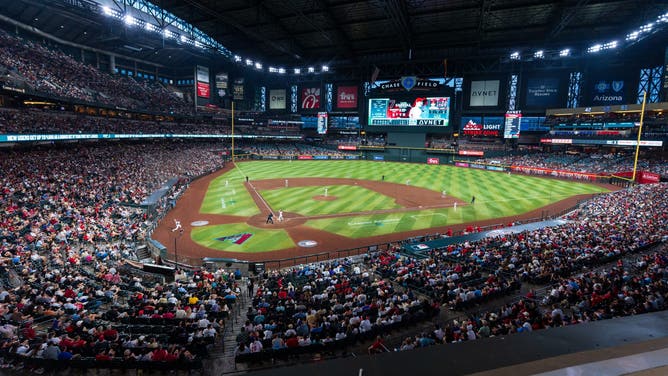Arizona Diamondbacks Facing ‘Climate Change’ Issues At Home, Media Claims
The Arizona Diamondbacks have been in a long-running negotiation with local jurisdictions over necessary renovations to its 26-year-old stadium. That's not an uncommon position for a Major League Baseball team to find itself in, as teams generally don't like paying for their own stadiums or improvements.
But according to the media, those improvements aren't just because of the general age of the stadium or the organization's desire to increase revenue. They're because of the impact of "climate change" on the weather in Phoenix. Seriously.
The Guardian reported on discussions between the team and the city, explaining that after paying for the Phoenix Suns to upgrade their building, local government doesn't want to contribute to Diamondbacks construction, estimated to cost at least $400-500 million. But that's not the only problem, they claim:
"This financial dispute is taking place against the backdrop of dire climate warnings for the city, including that by 2100 it will be too dangerous for anyone – athlete or otherwise – to work outside for 162 days of the year, and the team is already struggling to keep the stadium cool enough for fans throughout the summer," the article claims.
And it gets worse from there.

Aug 10, 2024; Phoenix, Arizona, USA; A general view of the fans in attendance for a baseball game between the Philadelphia Phillies and Arizona Diamondbacks at Chase Field. Mandatory Credit: Allan Henry-USA TODAY Sports
Arizona Diamondbacks Need Climate Controlled Stadium Because The Desert Is Hot
The article continues its bewildering lack of awareness by saying that the Texas Rangers specifically built their new stadium, Globe Life Field, with a retractable roof because of concerns over climate change. They built a stadium with a retractable roof because the Dallas area is miserably hot for the vast majority of the baseball season. It always has been, and it always will be.
Climate change has nothing to do with Texas being hot in the summer, just like it has nothing to do with Phoenix being hot in the summer. Of course those organizations need to consider their local climate when building a stadium, because nobody wants to go sit in 100 degree heat to watch a relatively meaningless baseball game in July.
The Guardian claims that the weather in Phoenix will be too hot for anyone to work outside 162 days per year in the future because of climate change. Which is absurd for several reasons, chief among them being that Major League Baseball teams play half their games on the road. The Diamondbacks only play at home for 81 days in a season, not 162. Additionally, the Diamondbacks this season, for example, hosted 28 home games from March-May, when the weather in Phoenix is generally comfortable. Especially at around 7 pm local time when most games start. So, roughly 35% of the team's games take place when the climate in Phoenix ranges from cool to mild to pleasantly warm.
It's not 162 days per year that the weather makes it too hot to sit outside at Diamondbacks games. It's not even 81. It's more like 50ish. And it's been like that forever, which is why they built a retractable roof in the first place.
Not to mention that fears over "climate change" are almost certainly overblown. For decades, scientists have been making predictions of doom as to what would happen in the future without a drastic reduction in emissions. Virtually all of them have proven laughably false.
It's almost a guarantee that the Diamondbacks organization isn't even remotely considering "climate change" when discussing new stadium plans. They're considering how best to monetize their fanbase for as many days as possible. In fact, team president and CEO Derrick Hall, who's misidentified in the sloppy article as the team's owner, said exactly that just last month.
"It’s about mixed-use, it’s about activating 365 days per year, hotels, restaurants, retail and office space," Hall told Sports Business Journal.
If the Diamondbacks were so concerned about climate change making Phoenix an unlivable hellscape, why in the world would they want to be involved in building a stadium and surrounding amenities to attract people downtown even more frequently?
The Guardian, like so many far-left media outlets, started with the premise that climate change must be addressed in every walk of life, then twisted (sometimes inaccurate) facts to fit the predetermined narrative. They're wrong.